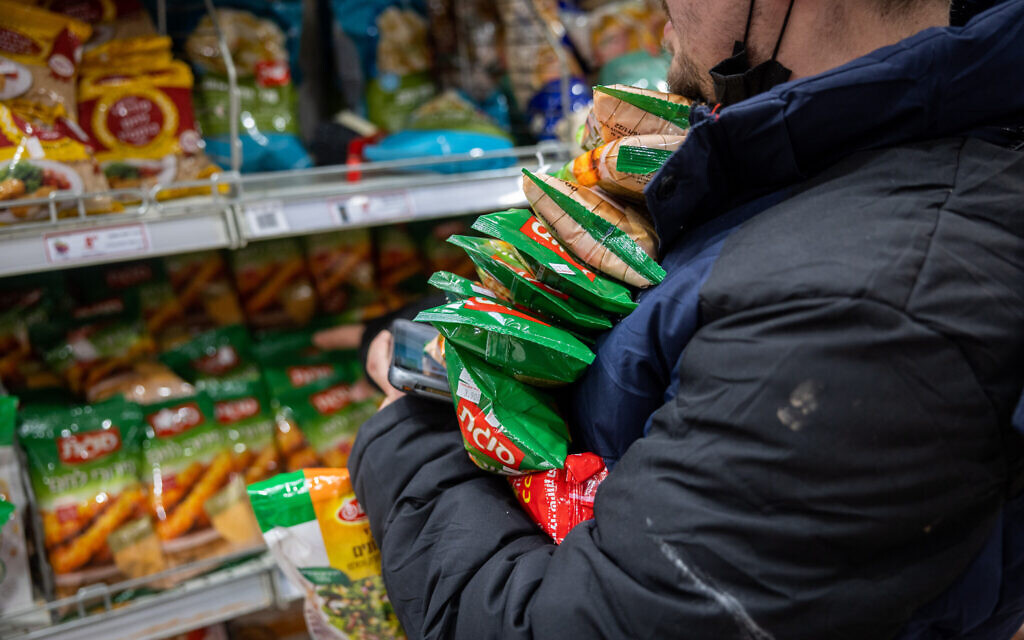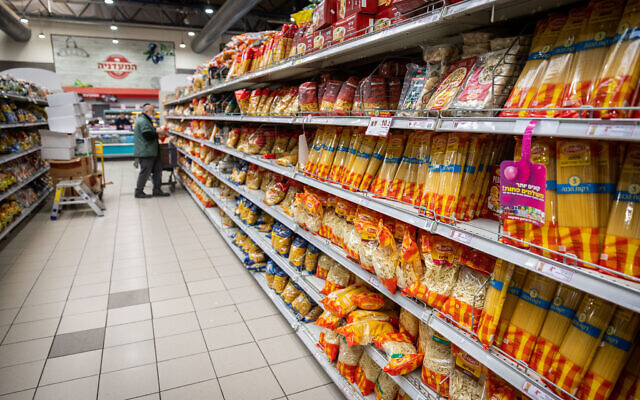Israel could do more to curb price hikes long-term, says former central bank chief
State should open up food market for imports, encourage price transparency, and consumer can be more proactive, suggests Dr. Karnit Flug

Israel should implement policies that enhance competition in the food and home goods sector by opening up the market for imports, encourage price transparency strategies, and help increase consumer awareness if it hopes to effectively mitigate prices hikes among major companies and retailers and have a lasting effect on reducing costs, said Dr. Karnit Flug, a former governor of the Bank of Israel and currently a VP at the Israel Democracy Institute.
Flug spoke to The Times of Israel this week amid an unusual dust-up between the government and seven major food and goods manufacturers and importers over expected price hikes that have drawn consumer outrage and calls for boycotts.
Finance Minister Avigdor Liberman and Economy Minister Orna Barbivai sent letters on Sunday to the heads of these major food companies, including Strauss Group, Osem (owned by Swiss multinational Nestle), Sano, and three other major importers, urging them to reverse their decisions to raise prices, accusing them of exploiting the situation to turn more profits in a move they called “cynical and offensive” mid-pandemic, and threatening to “take the required steps to secure a fair, competitive economy.”
Liberman followed up the letters by ordering a review of the competition in the consumer goods market and the Finance Ministry’s Chief Economist Office published a report later in the week detailing 10 of the major food companies’ high profit margins in recent years, with an overall estimated NIS 600 million ($188 million) in 2019 alone.
The expected price increases, depending on the company, ranged from 10% to 50%.
The report showed “the very high profit rates of the largest producers and importers in Israel [and] suggests that they do not operate in a competitive environment,” said Flug, who served as the central bank’s chief from 2013 to 2018.
Food prices in Israel have risen 50% over the past two decades and are between 25 and 80% above the OECD average, with dairy products, soft drinks, and grain-based products particularly expensive (as of 2017 data, according to the OECD).

A State Comptroller report published last year noted that the Israeli economy was characterized by over-concentration in some sectors, like food and household goods like cleaning products, compared to other markets. “In the years 2015-2020, the market share of the 10 largest suppliers in the food industry and in the field of consumer products was about 54% on average, and the supplier with the largest market share in 2020 held about 12% of the total food market,” the report, published in May 2021, said.
The document also noted that Israeli households’ expenses on food and home goods (not including alcoholic beverages) amounted to about 18.5% of their budgets (or their third-largest household expense).
Industry push-back
In response to state pressure this week, the food producers and importers announced that they would postpone the expected price hikes. But the Manufacturers’ Association, an organization that represents some 1,500 firms and 400,000 workers, placed much of the blame for price increases on the government, Reuters reported.

“If the government wants to reduce the cost of living, it must reduce prices of electricity, water, property taxes and fuel tariffs that have jumped by tens of percent in recent years,” said the group’s president, Ron Tomer, according to the report. “The government cannot on one hand sharply raise tariffs and on the other expect prices to fall.”
In addition to the high costs of food products, Israelis are also dealing with jumps in the cost of electricity, which is rising by 5.7% this month, costing the Israeli household an estimated addition of NIS 35 (just over $11) per month. The price of gasoline is increasing by NIS 0.34 ($0.11) per liter, costing the Israeli consumer an addition of NIS 17 ($5.36) on average while refueling their car.
Liberman has defended the energy cost hikes as modest compared to the rest of the world.
Throughout 2021, the cost of consumer goods in Israel rose by 2.8% in 2021, the highest rate in 13 years, according to data released by the Central Bureau of Statistics. Rises in the consumer price index were seen in clothing and footwear (1.1%), home furnishings (0.7%) and food (0.5%).
Flug said that in the food and retail sector, a reduction of import tariffs, which the government plans to implement “will do some of the work,” as will “applying the antitrust laws in a more effective way.”
“We still have high concentration in the retail chains,” she explained, and “the enforcement of antitrust laws can go some way” toward curbing “practices of price-fixing and coordination, practices that are not acceptable.”
Israel’s Competition Authority has a key role to play, Flug told The Times of Israel, as do the consumers themselves. Israel consumers could stand to be more proactive in price comparisons to inform their purchasing decisions, she said, using site-comparison sites like ZAP for example.
The State Comptroller report recommended that the Competition Authority “use the tools provided to it by the legislature… to remove barriers to competition in the food industry and lower the cost of living in Israel.”
Among these tools are “parallel imports,” where retailers and new importers can purchase products directly from original food producers abroad rather than doing so via the main importer. However, currently, parallel importers are subject to more red tape and costly customs procedures that can hinder competition (like in the car industry).

“The Competition Authority must continue to act to promote parallel imports, examine alternatives and formulate appropriate measures for action with the direct importers in order to prevent harm to competition,” said the State Comptroller report.
Another key tool is price transparency, said Flug, citing as an example a recent Bank of Israel move to enact a series of reforms in the banking industry meant to make the process of taking out a bank mortgage more transparent and competitive for borrowers.
Flug said price transparency was a “relatively simple tool… that can be very effective at enhancing competition.”
The Finance Ministry’s Chief Economist Office report this week noted that since major food companies and importers are private companies, and are thus not required to make financial statements available to the public, consumers have a more difficult time truly understanding the price differences between products in Israel and other countries and the extent to which competition in Israel is lower.
Look at the upside
Flug stressed that it was important to look at the overall picture and consider how far Israel has come in the past decade alone.
The country passed the Law for Promotion of Competition and Reduction of Concentration in 2013 aimed at busting pyramid-like structures and opaque conglomerates. Some of the country’s previously powerful business “tycoons,” like Nochi Danker of IDB Group, began falling by the wayside.
But overall, said Flug, “Israel is a relatively small economy and in some sectors, there are returns to scale that limit the number of players in operation. In some sectors, there’s been a lot of progress in reducing the concentration and enhancing competition. And in others, there is still work to do.”

Flug pointed to the “impressive reforms” over the past 15 years in the telecommunications market, which brought down prices by mobile phone operators significantly and “is now considered a very competitive sector.” Similarly — and more recently — the financial services sector is also undergoing important changes that will pave the way for more competitive rates and new financial services for customers.
“In some sectors, change is underway, and in some, there’s been a lot of progress,” she said.
There is also occasional consolidation. In 2020, Israel’s Competition Authority approved Cellcom’s acquisition of Golan Telecom, the relative newcomer to the industry that was credited with bringing down prices since its entry into the market in 2012. The acquisition, estimated at approximately NIS 590 million ($185 million) made Cellcom the country’s largest mobile operator.
And on Thursday, Israel’s largest food retail chain Shufersal said it signed an agreement to buy a small importer of electronics, Mini Line, for NIS 560 million ($176 million). The company is the official importer of home appliances and goods from AEG, Samsung, and Electrolux. The proposed sale will need the approval of the Competition Authority.
Israel’s resilient economy
Flug said Israel’s economy overall has shown resilience and notable growth, even in a pandemic.
“Israel has been through a challenging two years and there was a substantial decline in economic activity in 2020 — GDP declined by some 2.2%, which is very severe relative to other periods of economic decline or recession. But when we compare the decline here to other advanced economies, the decline was more modest and that is thanks to the relatively high share of the high-tech sector in the economy, which accounts for 15% of GDP, which is double its share in the average OECD country,” she described.
This structure of the economy made Israel “relatively more resilient to the shock of the pandemic.”
“In 2021, we saw a strong and rapid recovery, in the growth numbers, in the rapid decline of unemployment, in tax collections. And when we look at where we are by the third quarter of 2021, we were already at GDP per capita at 2% higher than the level before the pandemic. Many advanced economies did not reach their pre-pandemic GDP per capita numbers. Our relative situation has been good, when we look at the macro [level],” she said.

However, she acknowledges that “different groups have been affected differently by the pandemic. The sectors most affected were those where people with lower income tend to work and the sectors that actually enjoyed very strong demand, which is high-tech… employed ‘stronger’ populations with higher wages. So the shock accentuates the income inequality and the income gaps, which were high before the pandemic, are even higher now.”
The current recovery track suggests that 2021 “ended with a growth rate of around 6.5% and 2022 GDP growth is projected to be 5.5%. These are subject to high uncertainty because we don’t know how severe the impact of the Omicron wave will be. If it’s relatively short, a few weeks, the macroeconomic effects will be relatively modest, partly because we learned how to operate under the waves of the pandemic. And if it’s short, the effect will be modest. If it’s for long — a few months — and if we end up having some closures, the effect will be more severe.”
“Even if we have closures, they will be more tailored and some sectors will continue to operate… We learned how to deal, to some extent, with the pandemic but still in sectors like commerce, restaurants, tourism — if the wave is long, it will certainly have a severe decline in activity,” added Flug.
Government policy overall, she said, “has been supportive of households and businesses that have been affected,” comparing the support to that given by governments in the average advanced economy.
“After a little bit of hesitation at the beginning, when you look at all the programs together, they were quite effective in limiting the decline in disposable incomes of households, both for employees and the self-employed,” she explained.
Flug said that the current environment, though uncertain, is quite removed from the situation in 2020.
“At the height of the first lockdown, unemployment climbed to 36%, so we are nowhere near that. It’s important to give some confidence to businesses that those sectors of industries that are severely affected would be compensated. There were some statements made by the Minister of Finance early on that were not very reassuring in that respect, but the government has realized that there will be a need to provide support to those who are severely affected, and over the last weeks, some assistance schemes were presented,” she recalled.
“The assistance should be targeted to those who are severely affected — the pandemic is not affecting everyone the same. There is absolutely no reason now to provide assistance not based on the criteria of the damage caused by the current pandemic wave.”
Flug said that one important issue that needs more attention is the group of people “who reached the limits of their unemployment insurance entitlement” and who “depleted their access to unemployment insurance.” She said that there should be attention paid to those people and what kind of tools should be used to provide them with income, particularly in sectors directly affected by the current wave.
Government support “should be directed to people in sectors that are affected by the restrictions or the pandemic. Even in places where you don’t have government-imposed restrictions, activity may go down to 0 because people are reluctant to consume services that involved large crowds and physical contact,” she stressed.
TOI staff contributed to this report.
There's no paywall on The Times of Israel, but the journalism we do is costly. As an independent news organization, we are in no way influenced by political or business interests. We rely on readers like you to support our fact-based coverage of Israel and the Jewish world. If you appreciate the integrity of this type of journalism, please join the ToI Community.

We’re really pleased that you’ve read X Times of Israel articles in the past month.
That’s why we started the Times of Israel eleven years ago - to provide discerning readers like you with must-read coverage of Israel and the Jewish world.
So now we have a request. Unlike other news outlets, we haven’t put up a paywall. But as the journalism we do is costly, we invite readers for whom The Times of Israel has become important to help support our work by joining The Times of Israel Community.
For as little as $6 a month you can help support our quality journalism while enjoying The Times of Israel AD-FREE, as well as accessing exclusive content available only to Times of Israel Community members.
Thank you,
David Horovitz, Founding Editor of The Times of Israel








